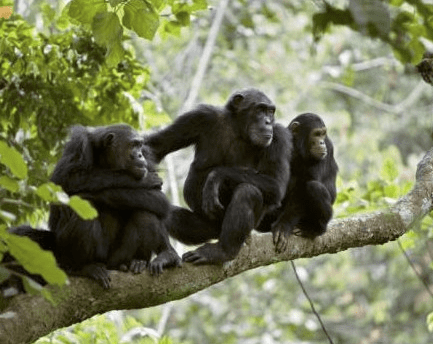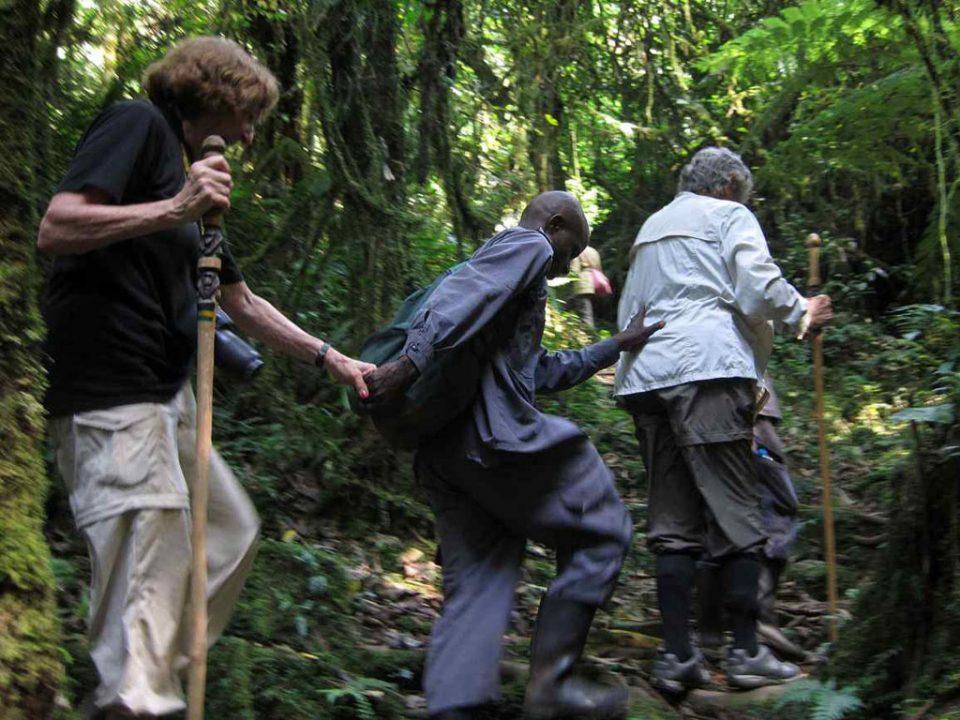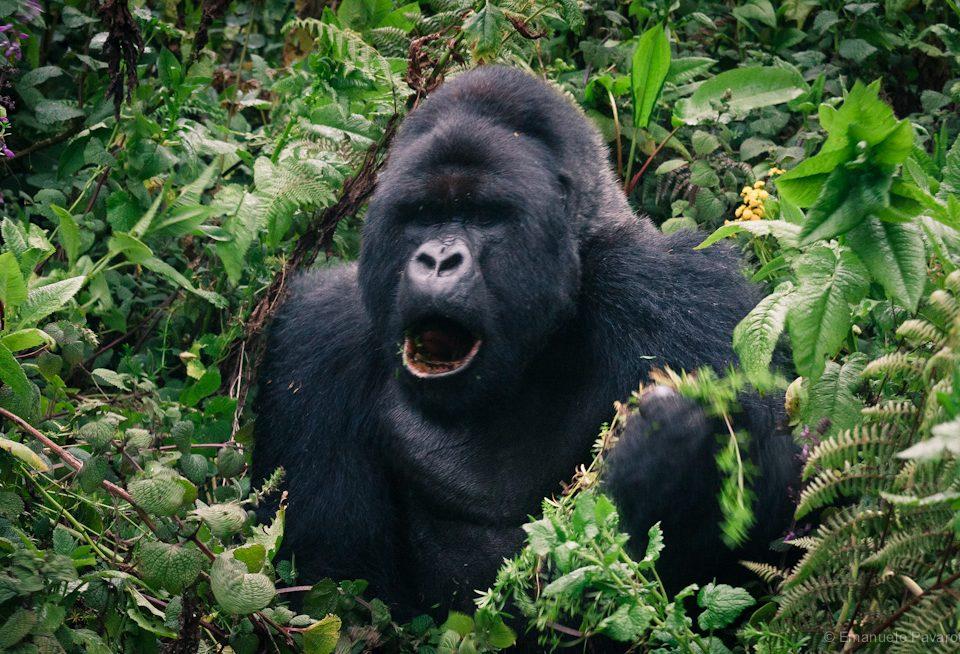
Chimpanzee Habituation Experience is one most remarkable primate safari experience holidaymakers shouldn’t miss to be part while on Uganda safaris. It comes second after chimpanzee tracking that offer visitors a great opportunity to enjoy a close encounter with chimpanzees while in their natural habitat. Chimpanzee Habituation is of no doubt one most captivating primate experience taking you either half day or full day of following the semi-habituated chimpanzee community.
Chimpanzee Habituation Experience entirely takes a process of up-to about 2 years less or more depending on quick a chimpanzee community can get accustomed to human presence. During a day or full day chimpanzee habituation, visitors accompany researchers and a group of habituators in the jungles to observe the whole day general behavior of chimpanzees till they make new nests for overnight stay.
A typical day of chimpanzee habituation adventure in Uganda begins between 6:00 to 6:30 am. You begin with an early morning breakfast, have lunch and plenty of drinking water to carry for your half day or full day chimp habituation. On actual interaction with chimpanzees, some of the traits to expect to explore include feeding habits, copulating, breastfeeding, hunting, patrolling, resting and grooming.
About chimpanzees
Chimpanzees are a few distinct species among the Great Apes’ families. They belong to the great apes’ families which includes humans, bonobos, gorillas and orangutans. These Great Apes thrive within the Central and West Africa with a huge profusion of chimpanzees ranging within the tropical rain-forest. In Africa, chimpanzees exist in about 21 countries.
Chimpanzees (Pan Troglodytes) are also most famous as the common chimpanzees, chimp or robust chimpanzees. They are a few distinct creatures and also considerably the closest living relatives to humans. They have about 98.7% of their genetic DNA similar to humans and they come with a coarse black hair yet with bare face, fingers, palms, toes. They are generally robust unlike the bonobos with males weighing up to 40-70kgs while females weigh 27-50kgs.
Chimps are social creatures and they live in communities ranging from 20 to 150 members. Each of the chimpanzee communities is headed by a mature adult male also famous as an alpha male. It is the responsibility of an alpha male to patrol the territory, protect the rest of its members and also lead them to areas with plenty of pastures to forage.
Chimpanzees are very intelligent and they feed mainly on leaves, fruits, plants and in some cases insects, nuts to mention but a few. They express themselves in different ways using facial expressions, sounds and postures. They produce one baby chimp at a time and takes females about 3-5 years to wean the baby. Females can be in position to produce when they are 13 years and males become adults at 15 years.
Chimpanzee Habituation destinations in Uganda
A large population of chimpanzees in Africa is in Uganda’s jungles. An estimated population of about 5600 chimps are in distinct chimpanzee destinations in Uganda and the notable places to go for chimpanzee habituation include;
Kibale Forest National Park
Spanning for up to 795sq.kms, Kibale Forest National Park is popular as the Primate Capital of the World, sheltering all 13 primate species in one habitat. These include a huge population of chimpanzees estimated to be over 1500 making it not only the favorite chimpanzee trekking/tracking destination but also an ideal place to go for chimpanzee habituation while on Uganda safari.
Kibale is largely a rain-forest, straddling in Western Uganda just at the border districts of Kibaale, Kamwenge, Kasese and Kabarole. It protects many chimp communities that make it one favorite chimpanzee tracking destinations in East Africa. All treks in Kibale start from Kanyanchu Tourist Centre with briefing at 7:00am and chimp habituation at 6:00am.
On chimp habituation, your exploration is beyond seeing chimpanzees but also you have a chance to spot birds, primates, floral species and butterflies. Other than chimps, Kibale Forest National Park also shelters bush babies, pottos, L’Hoest monkeys, blue monkeys, grey cheeked mangabeys, red tailed monkeys. Chimp habituation permits for Kibale Forest National Park are available for purchase at US Dollars 220 per person.
Budongo Forest
Sprawling in Northwestern Uganda, Budongo Forest Reserve is one spectacular place to see chimpanzees while in their natural habitat. It is an incredible place worthy visiting by holidaymakers who are interested in chimpanzee habituation experience. Chimp habituation in Budongo is carried out along Kaniyo-Pabidi starting from Budongo Eco-Lodge with briefing.
Other than Budongo Forest Reserve and Kibale Forest National Park, chimpanzees in Uganda exist in Kyambura Gorge, Kalinzu Forest, Ngamba Island Chimpanzee Sanctuary, Semuliki National Park/Reserve.
Chimpanzee habituation rules
• Chimp habituation is strictly for persons above 15 years.
• A 8-10m distance must be kept away from chimps.
• Like during the normal chimp trek, use of flashlight camera is highly prohibited.
• Smoking, eating and drinking is prohibited during chimp habituation.
• Please have your mouth covered when coughing and nose when sneezing.
What to carry
• A valid chimpanzee habituation permit.
• Light rain-jacket/poncho
• Packed lunch
• Bottled drinking water
• Waterproof hiking boots
• Insect repellents
• Medical/First aid kit
• Valid passport
• Long-sleeved shirt/t-shirt
• Camera without flashlight
• Long trousers
• Sun glasses
• Sun hat
• Toiletries
When to travel for chimpanzee habituation
Chimpanzee habituation safari to Uganda can be arranged at any time of the year. The most months of the year to travel for chimp habituation are; March, April, May and November. However, some visitors prefer traveling for chimp habituation during the dry months of the year (from June to September and December to February) when the chimpanzee destination experience no or the least amount of rainfall.
Where to stay
Lodging options in Budongo Forest include Budongo Eco Lodge while in Kibale Forest National Park, they include Ndali Lodge, Chimpanzee Nest, Primate Lodge and Papaya Lake Lodge.




1 Comment
Ici en France, nous n’avons pas de chimpanzés